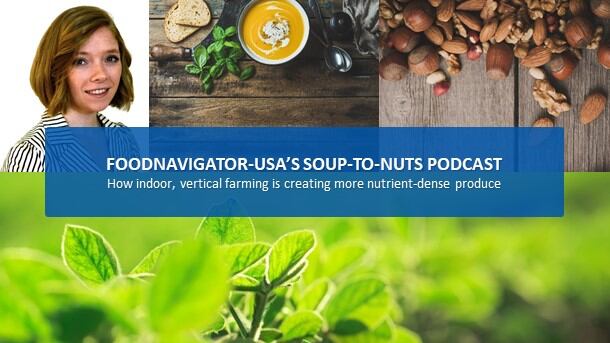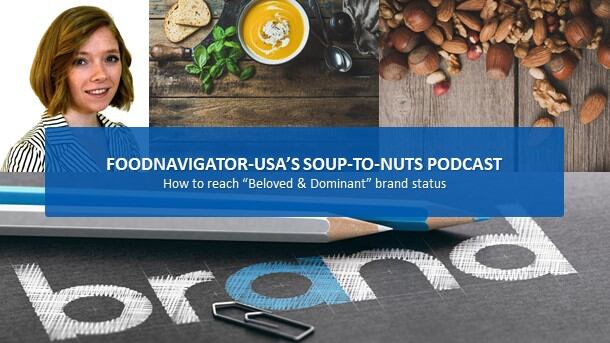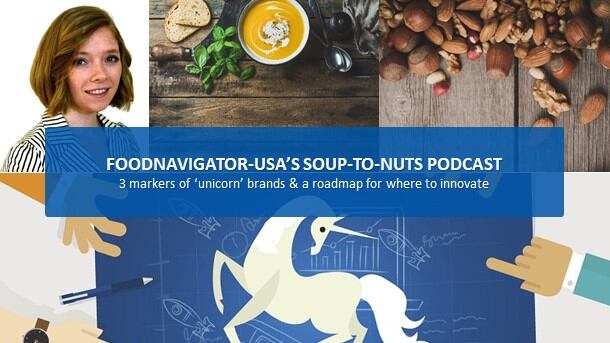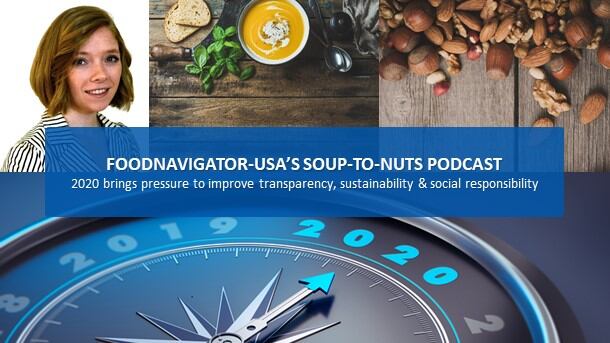Crop One Farm, which claims to be the largest completely controlled and contained vertical, hydroponic farming company, is testing how it can not only grow produce more efficiently and sustainably indoors, but also how it can improve the quality of the leafy greens that sells under its Fresh Box Farms brand and through its food service and catering partnerships.
In this episode of FoodNavigator-USA’s Soup-To-Nuts podcast, Jenna Bell, the VP of nutritional science at Crop One, and Deane Falcone, the chief scientific officer for the indoor farm, explain they how are able to control specific growing conditions to produce nutritionally dense greens all year, anywhere, to better meet consumers’ growing demand for healthy, local food. They also explain how Crop One Farms’ unique modular construction allows it to set up shop in areas that otherwise would be unsuitable for farming fragile leafy greens. Finally, they outline how vertical farming benefits the environment, and what Crop One Farms is doing to become carbon neutral.
[Editor’s note: Never miss another episode of FoodNavigator-USA’s Soup-To-Nuts Podcast – subscribe on iTunes, today.]
Crop One’s modular construction simplifies scaling
According to Bell, Crop One’s unique modular technology and growing process set it apart from other vertical farming companies and serve as the foundation for how it produces crops that are more nutrient dense, sustainable and at higher yields than competitors.
“We really want to look at how we can increase the density of food in a smaller space. So, how can we kind of densify farming? How can we stack it?” and in the process use less land and water and produce food closer to consumers so there is less loss and waste, Bell said.
“And one of the ways that we do that which is quite different is that we are actually looking at modular based, very large farms … that really can go anywhere in the world,” because they go up – not out – and are completely environmentally controlled, she said.
“Tricking plants” to be more nutrient dense
In addition to providing Crop One versatility in where they grow crops, Bell notes the company’s unique set-up and technology allows it to more tightly control the plants’ environment to create a higher quality, more nutrient dense crop.
“We also have plant-specific growing conditions. So we can tinker with the humidity, the temperature or the CO2. We can adjust everything to really optimize, not just the yield” but the nutritional value, Bell said.
Falcone explains that Crop One is able to manipulate the environment to produce higher quality, and quantity, of produce because it combines computer technology, plant science and state-of-the art “growth infrastructure,” including racks, plumbing and water control.
“To get the most out of that system … we do something that’s called a multiple harvest system, and this gets into a real differentiator because we don’t see this happening too much with the competition,” he said, explaining that rather that harvesting just one crop from a plant, the company can regrow some varietals six or seven times before it needs to replant.
In addition to boosting quality, the company’s technology allows it to improve the quality of the plants it grows by controlling their environment and the nutrients they absorb for optimal nutritional value, which Falcone notes is impossible outdoors.
While Crop One’s plant scientists have learned a lot about how to improve the quality of the produce they grow since the company launched in 2015, Bell says the company – an indoor farming industry more broadly – has barely begun to explore the full potential of what she described as “tricking the plants” into producing more of the nutrients people need.
“We’re looking at the starting line from this vantage point, but there seem to be an infinite number of ways to do some tweaks and change some nutrient levels,” she said.
Sustainability is a still a foundational value
As with other vertical or indoor farms, Crop One Farms is also focused on producing more with less so as to sustainably feed the growing population without draining the planet’s limited resources. For example, Falcone explained that Crop One’s modular technology allows it to use only 1% of the amount of water required by traditional agriculture and use land 400 times more effectively than outdoor farms.
While indoor farming may better manage space and water, many critics of the emerging industry point to the high amounts of energy it requires to keep the lights and other environmental factors at optimal levels for plant health.
Bell and Falcone acknowledged this concern, but said that Crop One is actively working to become carbon neutral in part by scaling up to improve the ratio of output to input, and also by exploring to technological advancements.
Market potential
While Crop One and other indoor farms become more efficient and sustainable, they will be able to produce more at a price point that is attainable to more consumers. And as it does, the still emerging industry will better be able to tap into a significant – and still growing – consumer demand for healthy, safe, local produce, Bell said.
She estimates that vertical farming has captured only 0.01% of the North American greens’ market, which is worth $8 billion. The produce market internationally is worth $500 billion, she estimates. These figures, and the speed of innovation in vertical farming currently, make it a “multi-winner industry right now.”
Bell sees tremendous potential in supermarkets as a branded produce provider, but also in food service where chains trying to sell healthier food can be destroyed by contaminated produce recalls – a risk that is far lower for produce farmed indoors.
With so much potential and advancing technology working in its favor, the indoor farming segment is nearing a tipping point, according to Belll, and as such she predicts retailers and foodservice will soon have increased access to the high quality produce that drives consumer foot traffic and sales.




